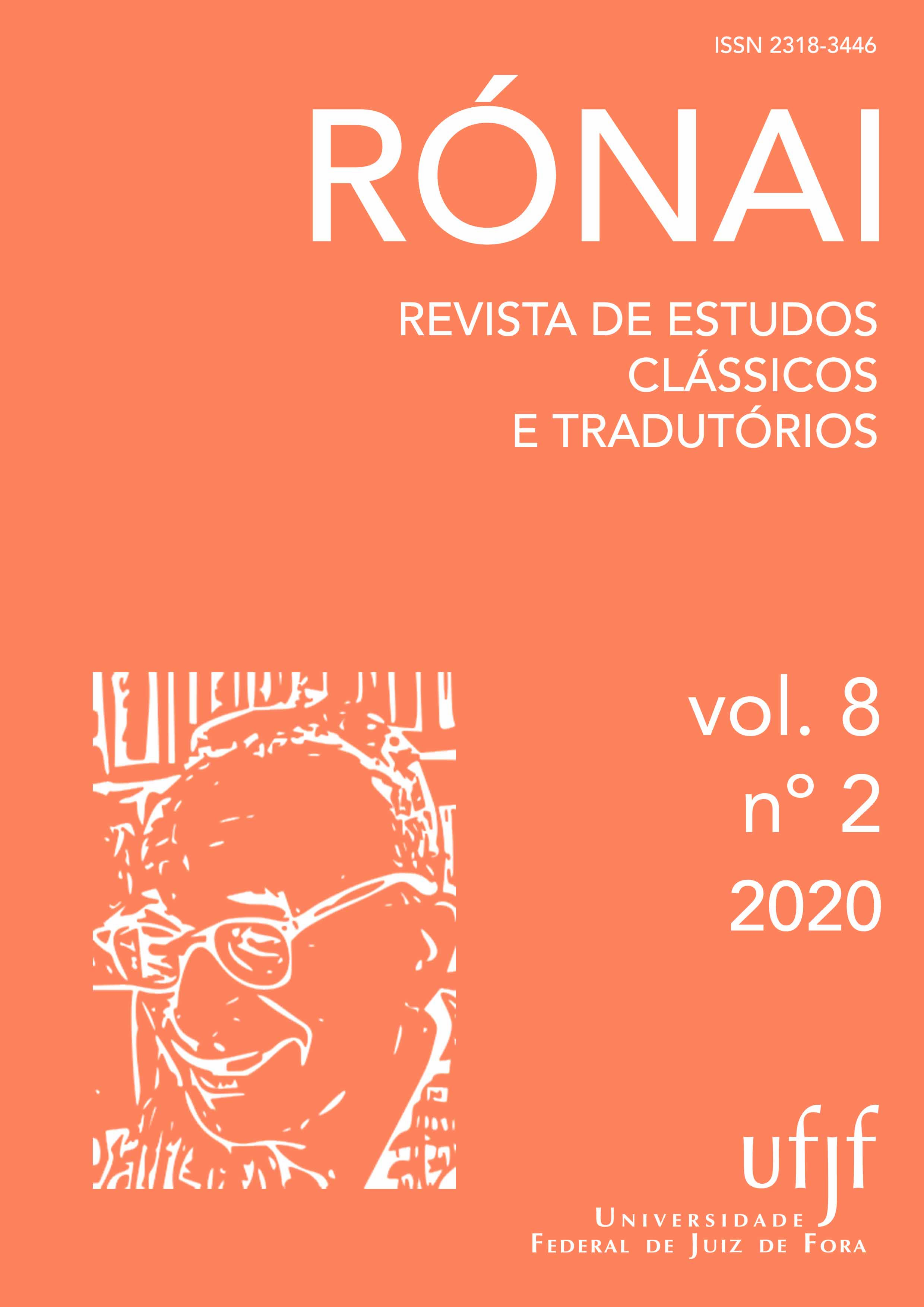The Sense of the term παρρησία in the Laches
DOI:
https://doi.org/10.34019/2318-3446.2020.v8.32337Keywords:
Plato, παρρησία, λόγοι, community, lifeAbstract
This article aims at analyzing the sense of the term παρρησία and its derivative verb παρρησιάζεσθαι in Plato’s Laches. The aim of the investigation is to consider the term and the verb in their semantic relationship with the other terms and concepts linked to them, and to show the sense acquired by this concept in the specific dialogical situation of this text. To this end, we have methodologically analyzed the semantics of other terms, as γελοῖον and ἀνακοινόω-ἀνακοινοῦσθαι, which we found in other Platonic dialogues and which are discussed in order to catch the sense of παρρησία in the Laches. The analysis of both texts and contexts we have conducted shows that the concept of παρρησία, at least in the Laches, characterizes the dialogical space as a dialogical community. In this dialogue, the παρρησία shows the need – for the interlocutors who “truly” want to discuss – of harmonizing the discourses with lives, according to the Socratic sentence of the Apology, by which an unexamined life is not worth to be lived.
Downloads
References
ADORNO, Francesco. Appunti su ὁμολογεῖν e ὁμολογία nel vocabolario di Platone. Dialoghi di archeologia. Milano: Il Saggiatore, vol. 2, 1968, p.152-72.
ARISTOFANE. Commedie. A cura di Giuseppe Mastromarco. Torino: UTET, 1983.
AST, G.A. Friedrich. Lexicon platonicum, sive Vocum platonicarum index. Lipsiae in Libraria weidmanniana, 1835-1838.
BELTRAMETTI, Anna. L’utopia dalla commedia al dialogo platonico. In: VEGETTI, Mario. Platone. La Repubblica. Napoli: Bibliopolis, 2000, p.233-256.
CAMBIANO, Giuseppe. PLATONE. Dialoghi filosofici. A cura di Giuseppe Cambiano. Vol. I. Torino: UTET, 1970.
CAMPESE, Silvia. La prima ondata: il ‘dramma femminile’. In: VEGETTI, Mario. Platone. La Repubblica. Napoli: Bibliopolis, 2000, p.150-195.
CAPRA, Andrea. Ἀγὼν λόγων, Il «Protagora» di Platone tra eristica e commedia. Milano: LED, 2001.
CAPUCCINO, C.. ΑΡΧΗ LΟΓΟΥ. Sui proemi platonici e il loro significato filosofico. Olschki: Firenze, 2014.
CENTRONE, Bruno. PLATONE. Teage, Carmide, Lachete, Liside. A cura di Bruno Centrone. Milano: BUR, 2006.
CHIESARA, Maria Lorenza. PLATONE. Protagora. A cura di M.L. Chiesara. Milano: Rizzoli, 2010.
DESCLOS, M.-L. (1992). La fonction des prologues dans les dialogues de Platon. In : VERNANT, Denis (ed.). Du dialogue (Recherches sur la philosophie et le langage, XIV). Paris: Vrin, 1992, p.15-29.
ERLER, Michael (2010). La parrhesia da Socrate a Epicuro. In: ROSSETTI, Livio; STAVRU, Alessandro (eds.). Socratica 2008. Studies in Ancient Socratic Literature. Bari: Levante Editori, 2010, 279-298.
FERRARI, Franco. PLATONE. Menone. A cura di Franco Ferrari. Milano: BUR, 2016.
FOUCAULT, Michel. Discorso e verità nella Grecia antica. Traduzione italiana a cura di Adelina Galeotti. Roma: Donzelli Editore, 1998.
GIANNANTONI, Gabriele. Dialogo socratico e nascita della dialettica nella filosofia platonica. Edizione postuma a cura di Bruno Centrone. Napoli: Bibliopolis, 2005.
GIANNONE, Maria Gisella. The Role of Parrhēsia in Isocrates. Antesteria, Madrid, vol. 6, 2017, p. 95-108. Disponibili in: https://www.ucm.es/preharq-hantigua/antesteria. Accesso in: 11/12/2020.
MARINO, Silvio. il corpo del dialogo. una teoria della comunicazione a partire dal protagora di platone e dal corpus hippocraticum. Paolo Loffredo: Napoli, 2019.
PALUMBO, Lidia. Socrate, I Socratici e la parrhêsia. In: DE LUISE, F. ; STAVRU, A.. Socratica III. Studies on Socrates, the Socratics, and the Ancient Socratic Litterature. Sankt Augustin: Academia Verlag, 2013, p.242-260.
RAAFLAUB, Kurt A. Des freien Bürgers Recht der freien Rede. In: ECK, W.; GALSTERER, H.; WOLF, H. (ed.). Studien zur antiken Sozialgeschichte. Festschrift F (hrgs). Vittinghoff, Köln-Wien, 1980, p. 7-57.
RADICE, Roberto. Lexicon I. Plato. Milano: Biblia, 2003.
SASSI, Maria Michela. Platone. Apologia di Socrate. Critone. A cura di Maria Michela Sassi. Milano: BUR, 1993.
SCARPAT, Giuseppe. Parrhesia. Storia del termine e delle sue traduzioni in latino. Brescia: Paideia, 1964.
SERRA, Giuseppe. Pseudo-Senofonte. Costituzione degli Ateniesi. Milano: Fondazione Lorenzo Valla-Mondarori, 2018.
SLUITER, I., ROSEN, R.M. (eds.). Free Speech in Classical Antiquity. Leiden-Boston: Brill, 2004.
SPINA, Luigi. Il cittadino alla tribuna: diritto e libertà di parola nell’Atene democratica. Napoli: Liguori, 1986.
TULLI, Mauro. La poesia nuova del Carmide. Studi Classici e Orientali. Pisa: Pisa University Press 1998, vol. 46 n.1, p. 377-83.
VAN RAALTE, Marlene. Socratic Parrhesia and its Afterlife in Plato’s Law. In: Sluiter- Rosen. Leiden: Brill 2004, p.279-312.
VEGETTI, Mario. Platone. La Repubblica. Traduzione e commento a cura di Mario Vegetti, vol. IV, Libro V. Napoli: Bibliopolis, 2000.
VEGETTI, Mario. Platone. La Repubblica. A cura di Mario Vegetti. Milano: BUR, 2007.
Downloads
Published
How to Cite
Issue
Section
License
Copyright (c) 2020 SIlvio Marino

This work is licensed under a Creative Commons Attribution 4.0 International License.
Copyright
The authors of the published contributions agree with the following items:
1. The authors keep the copyright and convey to the journal the right of first publication, the work being licensed under a Creative Commons Attribution License 4.0 International.
2. The authors are allowed and stimulated to publicize and distribute their work online after the publication in the journal, recognizing first publication in this journal.
3. The authors of the approved works authorize the journal to distribute their content, after publication, for reproduction in content indexes, virtual libraries and similars.
For more information about Creative Commons Attribution License 4.0 International, please, go to: https://creativecommons.org/licenses/by/4.0/deed.en
Editorial exemption
The authors of the published contributions are entirely and exclusively responsible for their contents. Its content does not represent an official position of Rónai - Revista de Estudos Clássicos e Tradutórios neither of Faculdade de Letras da Universidade Federal de Juiz de Fora or their partner institutions.



